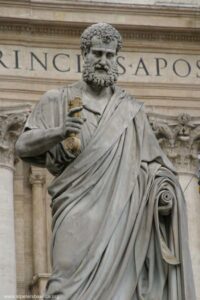
St. Mark was Peter’s scribe and disciple

St. Linus (67-76) 2nd Pope
Jerusalem and the Temple were destroyed, severing the Church’s last connection with Jerusalem.

St. Cletus (76-88) 3rd Pope

St. Clement I (88-97) 4th Pope
He instituted the notary public, recording the facts of the martyrdoms and persecutions.
His famous letter to the Church in Corinth sets for the doctrine of apostolic succession.
Russian Catholics, Rusian Orthodox, Ukranian Catholics, Ukranian Orthodox claim St. Clement I as their founder.
St. John, last of the Apostles, was still alive, when a schism in Corinth was resolved by St. Clement I

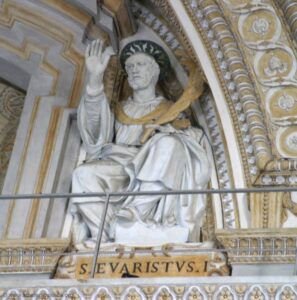
He founded the first seven diaconates, considered to be the origin of the College of Cardinals

St. Alexander I (105-115) 7th Pope

St. Sixtus I (115-125) 8th Pope

St. Telesphorus (125-136) 9th Pope
and peace to his people on earth.
almighty God and Father,
we worship you, we give you thanks,
we praise you for your glory.
Lord God, Lamb of God,
you take away the sin of the world:
have mercy on us;
you are seated at the right hand of the Father:
receive our prayer.
for you alone are the Holy One,
you alone are the Lord,
you alone are the Most High,
Jesus Christ,
with the Holy Spirit,
in the glory of God the Father. Amen”

St. Hyginus (136-140) 10th Pope

St. Pius I (140-155) 11th Pope

St. Anicetus (155-160) 12th Pope

St. Soter (166-175) 13th Pope

St. Eleutherius (175-189) 14th Pope

St. Victor I (189-199) 15th Pope
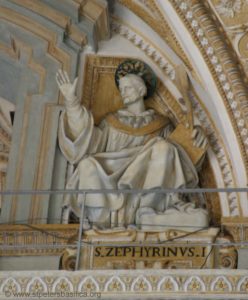
St. Zephyrinus (199-217) 16th Pope
He consolidated the pontifical supremacy over the bishops
He renewed the discipline of the Church toward adultery and immorality
Masses were said on top of the tombs. This started the practice of placing saints’s relics into altars.
Bitter arguments over the relationship between the human and divine nature of Jesus appear
The Church’s first formal schism appears
Some Christians believed that Jesus became man, not God.(Monarchianism)
Some Christians believed that it was the Father who died on the cross (Modalism)
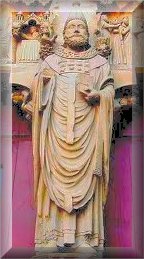
St. Callixtus (217-22) 17th Pope
He was a slave who suffered for his faith
There were large numbers of Christians throughout all the cities of the empire
In Rome Christianity appealed to the highest and lowest classes
Previously, it had been custom to exclude sacraments from any Christian who committed adultery and fornication
In order to adapt to growing Christianity, He decreed that those guilty of sexual crimes might return to the sacraments after due penance.
He ruled that early baptism was preferable
He claimed altering this custom fell under the binding and loosing authority given to Peter and his successors
He declared that within the Church that slave and free were equal
He declared that the laws of the Church regarding marriage take precedence over laws of the state
He was responsible for the excavation of the catacombs on the Via Appia
His opposition lead to the creation of the first anti-pope, Hippolytus
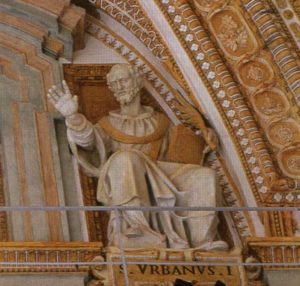
St. Urban I (222-230) 18th Pope
He consented to the acquisition of property by the Church
He ordered that chalices and patens were to be made of gold and silver
Because of persecutions, Christians began to gather in the catacombs for the Liturgy
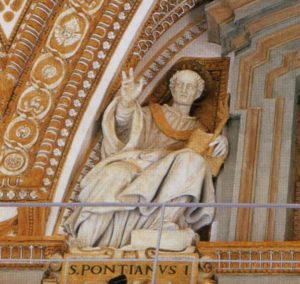
St. Pontian (230-235) 19th Pope
He ordered chanting of the Psalms
He convened a synod condemning that heresy that all men (including the devil) will eventually be reconciled with God (Origenism)
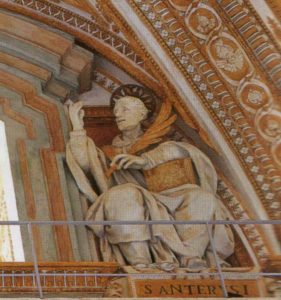
St. Anterus (235-236) 20th Pope
He wrote many epistles promoting tightening hierarchical relationships with the Church during the growing persecution
He ordered that the acts and relics of the martyrs be stored in churches
Some Christians followed a deterministic and dualistic Gnostic belief that the soul is good, but that matter is evil (Manicheanism)
